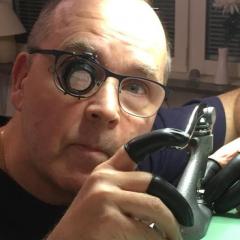-
Recently Browsing
- No registered users viewing this page.
-
Topics
-
Posts
-
By Neverenoughwatches · Posted
My thinking is yes it is better if you were to choose this or a tg, although the tg can do more . This way the watch is adjusted specifically to you and your routine. As an example i restored an old Smiths pin pallet watch ( typically an inaccurate movement ) around 3 months ago. Adjusted through 5 positions on a tg initially proved ok but not precise over time. Having then re- regulated the movement after each week of wearing over a period of 6 weeks brought the timekeeping in much closer, now within 1 minute/week -
Hi everyone, I am Michael and I am completely new to the watch making world. After buying a mechanical watch a couple of years ago and realizing that the time keeping degraded significantly recently...I started digging and got fascinated by the topic! I disassembled the watch with the Miyota 821a...and this gave the initial spark. Right now, the movement is still disassembled...and I am trying on a different movement my cleaning and lubrication before finalizing this project 😁 I am hoping to find help when I get lost and ask maybe some stupid questions - sorry for that in advance 😉 All the best, Michael
-
As it is your watch the answer is yes! When regulating a watch for someone else there's no way we can tell in what environment the watch is used and how often the wearer of the watch will wind it. In that situation, a timing machine is a handy tool to get close to something that likely will be acceptable. As indicated by @tomh207 and @clockboy a timing machine is a great way to quickly determine the health of the movement. If you are considering a Weishi I'd recommend the 1900 model over the 1000 model as the 1900 has a gain setting. These machines work well but aren't foolproof. If you want something more advanced I'd recommend the PCTM software from @praezis.
-
Hi guys, I am completely new to watch making and currently I am iterating on my cleaning process to get it right. My current process is a 3 step cleaning routine in an ultrasonic cleaner and drying afterwards in a food dehydrator at 45°C. 10min wash with Elma Red 1:9 at 58°C 5min rinse in distilled water 2min rinse in IPA 99% 10min drying in a food dehydrator at 45°C I have an old ETA 2842 which I use to test the process and the cleaning in general works pretty good...but I found one strange thing during one run I did yesterday. After the 10min wash cycle in Elma Red 1:9, the bright silver balance shock jewel metal housing colored black. Do you have an idea what happened here? Thanks, best regards Michael
-
By rjenkinsgb · Posted
I don't know if its pushing it in too far, but because the available batteries do not have a raised contact, clear of the case? I'm not keen on the idea of soldering to a battery, but possibly stick a small washer or similar metal spacer on with conductive paint or adhesive, plus a nylon washer around it?
-







Recommended Posts